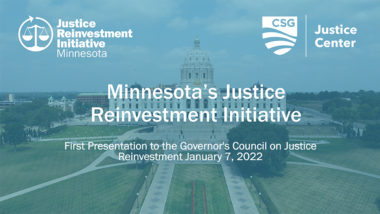
Minnesota Launches Bipartisan, Data-Driven Effort to Address Criminal Justice Challenges
Minnesota has one of the lowest incarceration rates in the country, instead relying heavily on community supervision. The state has the nation’s fifth-highest rate of people on probation, with two in every 100 adults in the state on probation as of 2018.
Despite Minnesota’s intent to keep people in the community, revocations make up a large portion of admissions to prison in Minnesota. More than 60 percent of prison admissions are due to supervision violations, which has caused state leaders to question the efficacy of the state’s current criminal justice policies and investments and pursue additional transparency and accountability for state funds dedicated to supervision.
The annual cost of managing correctional facilities, supporting county supervision partners, and providing reentry services is more than $600 million, of which just over one-fifth is dedicated to community supervision.
Additionally, the state’s probation system has become increasingly inequitable. In 2019, the rate of Black adults on felony probation was nearly five times higher than the rate of White adults on felony probation. For Native American and Latino adults, this rate was more than 9 and 1.7 times higher, respectively, than for White adults. The state is also ill-equipped to adequately support the high number of people with mental illnesses and substance use disorders in the criminal justice system.
To address these challenges, state leaders in Minnesota have launched a bipartisan, interbranch effort to improve community supervision outcomes and increase the likelihood of success for people on probation and supervised release (akin to parole) across all communities in Minnesota.
This effort is part of the federally funded Justice Reinvestment Initiative (JRI) and was jointly initiated by leaders from the state’s executive, legislative, and judicial branches as well as county leadership. The project will involve an extensive review of the state’s spending—particularly related to community supervision—to determine a more equitable funding model that allocates resources to communities across the state based on need.
The extensive review of the state’s criminal justice system will be led by The Council of State Governments (CSG) Justice Center and funded by the U.S. DOJ’s Office of Justice Programs, Bureau of Justice Assistance (BJA) and The Pew Charitable Trusts (Pew).
The CSG Justice Center will work in partnership with the Governor’s Council on Justice Reinvestment—recently assembled by Minnesota Governor Walz—composed of representatives from all three branches of government, county leadership, a Tribal representative, and key criminal justice stakeholders from both greater and metro Minnesota.
© MiguelMalo
This project was supported by Grant No. 2019-ZB-BX-K002 awarded by the Bureau of Justice Assistance. The Bureau of Justice Assistance is a component of the Department of Justice’s Office of Justice Programs, which also includes the Bureau of Justice Statistics, the National Institute of Justice, the Office of Juvenile Justice and Delinquency Prevention, the Office for Victims of Crime, and the SMART Office. Points of view or opinions in this document are those of the author and do not necessarily represent the official position or policies of the U.S. Department of Justice.
A positive school experience, where a child feels secure, is essential for their well-being. However, for many children…
Read MoreWhen returning to their communities from criminal justice settings, people with behavioral health needs face barriers in accessing…
Read More Supporting Children of Incarcerated Parents: Reimagining School and Community Collaboration
Supporting Children of Incarcerated Parents: Reimagining School and Community Collaboration
A positive school experience, where a child feels secure, is essential for their well-being. However, for many children with incarcerated parents—one in 14 in the U.S.—school can feel far from safe due to stigma, trauma, and a lack of understanding.
Read More Assigned to the Cloud Crew: The National Incarceration Association’s Hybrid Case Management for People with Behavioral Health Needs
Assigned to the Cloud Crew: The National Incarceration Association’s Hybrid Case Management for People with Behavioral Health Needs
When returning to their communities from criminal justice settings, people with behavioral health needs face barriers in accessing basic needs—including food, housing, employment, transportation, education, clothing, and substance use and mental health services—which increases their risk of experiencing a crisis.
Read More Meet the Medicaid and Corrections Policy Academy Mentor States
Meet the Medicaid and Corrections Policy Academy Mentor States
New Hampshire Department of Corrections Commissioner Helen Hanks presents at the Medicaid and Corrections Policy Academy in-person meeting.
Read More Taking the HEAT Out of Campus Crises: A Proactive Approach to College Safety
Taking the HEAT Out of Campus Crises: A Proactive Approach to College Safety
The sharp rise in school shootings over the past 25 years has led school officials across the U.S. to take a closer look at ways to keep students safe. For Chaffey College in Rancho Cucamonga, California, a tragic incident at a nearby university hit close to home and spurred campus leaders to revisit their own school’s threat assessments and crisis responses.
Read More New Smart Supervision Resident Analyst Program to Increase Supervision Agencies’ Data Analysis Capacity
New Smart Supervision Resident Analyst Program to Increase Supervision Agencies’ Data Analysis Capacity
Ideally, leaders would have actionable data readily available to them when they need it most. However, many agencies encounter significant challenges related to procuring accurate, consistent, and timely data, often grappling with outdated systems and inadequate tools.
Read More











